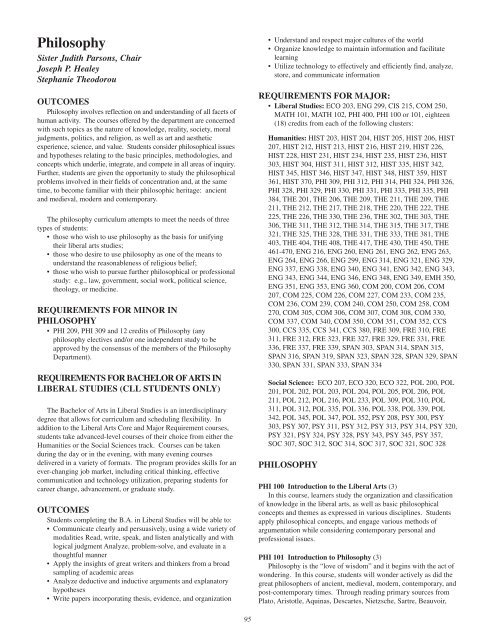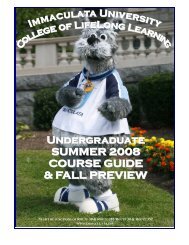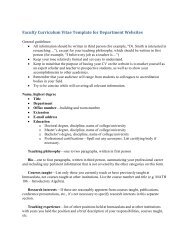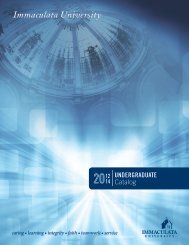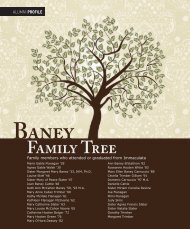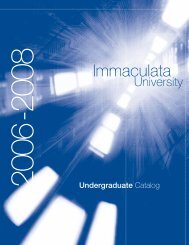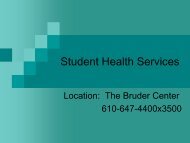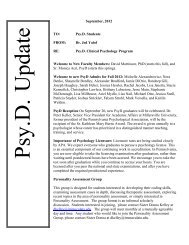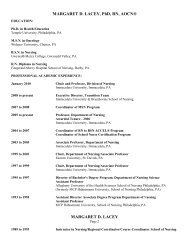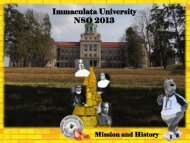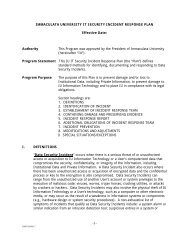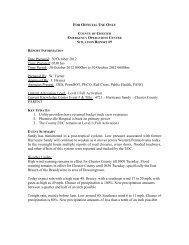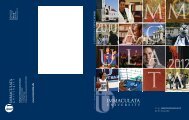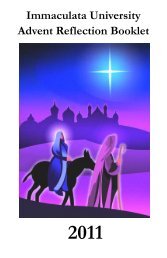Undergraduate Catalog 2008-2010 - Immaculata University
Undergraduate Catalog 2008-2010 - Immaculata University
Undergraduate Catalog 2008-2010 - Immaculata University
You also want an ePaper? Increase the reach of your titles
YUMPU automatically turns print PDFs into web optimized ePapers that Google loves.
Philosophy<br />
Sister Judith Parsons, Chair<br />
Joseph P. Healey<br />
Stephanie Theodorou<br />
OUTCOMES<br />
Philosophy involves reflection on and understanding of all facets of<br />
human activity. The courses offered by the department are concerned<br />
with such topics as the nature of knowledge, reality, society, moral<br />
judgments, politics, and religion, as well as art and aesthetic<br />
experience, science, and value. Students consider philosophical issues<br />
and hypotheses relating to the basic principles, methodologies, and<br />
concepts which underlie, integrate, and compete in all areas of inquiry.<br />
Further, students are given the opportunity to study the philosophical<br />
problems involved in their fields of concentration and, at the same<br />
time, to become familiar with their philosophic heritage: ancient<br />
and medieval, modern and contemporary.<br />
The philosophy curriculum attempts to meet the needs of three<br />
types of students:<br />
• those who wish to use philosophy as the basis for unifying<br />
their liberal arts studies;<br />
• those who desire to use philosophy as one of the means to<br />
understand the reasonableness of religious belief;<br />
• those who wish to pursue further philosophical or professional<br />
study: e.g., law, government, social work, political science,<br />
theology, or medicine.<br />
REQUIREMENTS FOR MINOR IN<br />
PHILOSOPHY<br />
• PHI 209, PHI 309 and 12 credits of Philosophy (any<br />
philosophy electives and/or one independent study to be<br />
approved by the consensus of the members of the Philosophy<br />
Department).<br />
REQUIREMENTS FOR BACHELOR OF ARTS IN<br />
LIBERAL STUDIES (CLL STUDENTS ONLY)<br />
The Bachelor of Arts in Liberal Studies is an interdisciplinary<br />
degree that allows for curriculum and scheduling flexibility. In<br />
addition to the Liberal Arts Core and Major Requirement courses,<br />
students take advanced-level courses of their choice from either the<br />
Humanities or the Social Sciences track. Courses can be taken<br />
during the day or in the evening, with many evening courses<br />
delivered in a variety of formats. The program provides skills for an<br />
ever-changing job market, including critical thinking, effective<br />
communication and technology utilization, preparing students for<br />
career change, advancement, or graduate study.<br />
OUTCOMES<br />
Students completing the B.A. in Liberal Studies will be able to:<br />
• Communicate clearly and persuasively, using a wide variety of<br />
modalities Read, write, speak, and listen analytically and with<br />
logical judgment Analyze, problem-solve, and evaluate in a<br />
thoughtful manner<br />
• Apply the insights of great writers and thinkers from a broad<br />
sampling of academic areas<br />
• Analyze deductive and inductive arguments and explanatory<br />
hypotheses<br />
• Write papers incorporating thesis, evidence, and organization<br />
• Understand and respect major cultures of the world<br />
• Organize knowledge to maintain information and facilitate<br />
learning<br />
• Utilize technology to effectively and efficiently find, analyze,<br />
store, and communicate information<br />
REQUIREMENTS FOR MAJOR:<br />
• Liberal Studies: ECO 203, ENG 299, CIS 215, COM 250,<br />
MATH 101, MATH 102, PHI 400, PHI 100 or 101, eighteen<br />
(18) credits from each of the following clusters:<br />
Humanities: HIST 203, HIST 204, HIST 205, HIST 206, HIST<br />
207, HIST 212, HIST 213, HIST 216, HIST 219, HIST 226,<br />
HIST 228, HIST 231, HIST 234, HIST 235, HIST 236, HIST<br />
303, HIST 304, HIST 311, HIST 312, HIST 335, HIST 342,<br />
HIST 345, HIST 346, HIST 347, HIST 348, HIST 359, HIST<br />
361, HIST 370, PHI 309, PHI 312, PHI 314, PHI 324, PHI 326,<br />
PHI 328, PHI 329, PHI 330, PHI 331, PHI 333, PHI 335, PHI<br />
384, THE 201, THE 206, THE 209, THE 211, THE 209, THE<br />
211, THE 212, THE 217, THE 218, THE 220, THE 222, THE<br />
225, THE 226, THE 330, THE 236, THE 302, THE 303, THE<br />
306, THE 311, THE 312, THE 314, THE 315, THE 317, THE<br />
321, THE 325, THE 328, THE 331, THE 333, THE 381, THE<br />
403, THE 404, THE 408, THE 417, THE 430, THE 450, THE<br />
461-470, ENG 216, ENG 260, ENG 261, ENG 262, ENG 263,<br />
ENG 264, ENG 266, ENG 299, ENG 314, ENG 321, ENG 329,<br />
ENG 337, ENG 338, ENG 340, ENG 341, ENG 342, ENG 343,<br />
ENG 343, ENG 344, ENG 346, ENG 348, ENG 349, EMH 350,<br />
ENG 351, ENG 353, ENG 360, COM 200, COM 206, COM<br />
207, COM 225, COM 226, COM 227, COM 233, COM 235,<br />
COM 236, COM 239, COM 240, COM 250, COM 258, COM<br />
270, COM 305, COM 306, COM 307, COM 308, COM 330,<br />
COM 337, COM 340, COM 350, COM 351, COM 352, CCS<br />
300, CCS 335, CCS 341, CCS 380, FRE 309, FRE 310, FRE<br />
311, FRE 312, FRE 323, FRE 327, FRE 329, FRE 331, FRE<br />
336, FRE 337, FRE 339, SPAN 303, SPAN 314, SPAN 315,<br />
SPAN 316, SPAN 319, SPAN 323, SPAN 328, SPAN 329, SPAN<br />
330, SPAN 331, SPAN 333, SPAN 334<br />
Social Science: ECO 207, ECO 320, ECO 322, POL 200, POL<br />
201, POL 202, POL 203, POL 204, POL 205, POL 206, POL<br />
211, POL 212, POL 216, POL 233, POL 309, POL 310, POL<br />
311, POL 312, POL 335, POL 336, POL 338, POL 339, POL<br />
342, POL 345, POL 347, POL 352, PSY 208, PSY 300, PSY<br />
303, PSY 307, PSY 311, PSY 312, PSY 313, PSY 314, PSY 320,<br />
PSY 321, PSY 324, PSY 328, PSY 343, PSY 345, PSY 357,<br />
SOC 307, SOC 312, SOC 314, SOC 317, SOC 321, SOC 328<br />
PHILOSOPHY<br />
PHI 100 Introduction to the Liberal Arts (3)<br />
In this course, learners study the organization and classification<br />
of knowledge in the liberal arts, as well as basic philosophical<br />
concepts and themes as expressed in various disciplines. Students<br />
apply philosophical concepts, and engage various methods of<br />
argumentation while considering contemporary personal and<br />
professional issues.<br />
PHI 101 Introduction to Philosophy (3)<br />
Philosophy is the “love of wisdom” and it begins with the act of<br />
wondering. In this course, students will wonder actively as did the<br />
great philosophers of ancient, medieval, modern, contemporary, and<br />
post-contemporary times. Through reading primary sources from<br />
Plato, Aristotle, Aquinas, Descartes, Nietzsche, Sartre, Beauvoir,<br />
95


